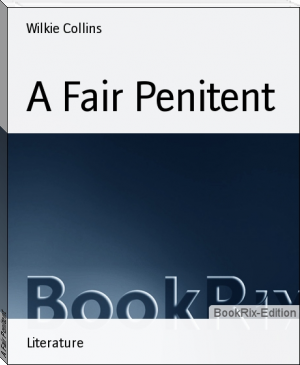Droll Stories - Volume 3 by Honoré de Balzac (best contemporary novels .TXT) 📖

- Author: Honoré de Balzac
Book online «Droll Stories - Volume 3 by Honoré de Balzac (best contemporary novels .TXT) 📖». Author Honoré de Balzac
"The ecclesiastical judge has ruled that as you become a bondsman only by accession, and because you were not born a bondsman, your servitude will cease with the cause that makes you a serf. Now, if you love me more than all else, lose your goods to purchase our happiness, and espouse me. Then when you have had your will of me, when you have hugged me and embraced me to your heart's content, before I have offspring will I voluntarily kill myself, and thus you become free again; at least you will have the king on your side, who, it is said, wishes you well. And without doubt, God will pardon me that I cause my own death, in order to deliver my lord spouse."
"My dear Tiennette," cried the jeweller, "it is finished--I will be a bondsman, and thou wilt live to make my happiness as long as my days. In thy company, the hardest chains will weigh but lightly, and little shall I reck the want of gold, when all my riches are in thy heart, and my only pleasure in thy sweet body. I place myself in the hands of St. Eloi, will deign in this misery to look upon us with pitying eyes, and guard us from all evils. Now I shall go hence to a scrivener to have the deeds and contracts drawn up. At least, dear flower of my days, thou shalt be gorgeously attired, well housed, and served like a queen during thy lifetime, since the lord abbot leaves me the earnings of my profession."
Tiennette, crying and laughing, tried to put off her good fortune and wished to die, rather than reduce to slavery a free man; but the good Anseau whispered such soft words to her, and threatened so firmly to follow her to the tomb, that she agreed to the said marriage, thinking that she could always free herself after having tasted the pleasures of love.
When the submission of the Touranian became known in the town, and that for his sweetheart he yielded up his wealth and his liberty, everyone wished to see him. The ladies of the court encumbered themselves with jewels, in order to speak with him, and there fell upon him as from the clouds women enough to make up for the time he had been without them; but if any of them approached Tiennette in beauty, none had her heart. To be brief, when the hour of slavery and love was at hand, Anseau remolded all of his gold into a royal crown, in which he fixed all his pearls and diamonds, and went secretly to the queen, and gave it to her, saying, "Madame, I know not how to dispose of my fortune, which you here behold. Tomorrow everything that is found in my house will be the property of the cursed monks, who have had no pity on me. Then deign, madame, to accept this. It is a slight return for the joy which, through you, I have experienced in seeing her I love; for no sum of money is worth one of her glances. I do not know what will become of me, but if one day my children are delivered, I rely upon your queenly generosity."
"Well said, good man," cried the king. "The abbey will one day need my aid and I will not lose the remembrance of this."
There was a vast crowd at the abbey for the nuptials of Tiennette, to whom the queen presented the bridal dress, and to whom the king granted a licence to wear every day golden rings in her ears. When the charming pair came from the abbey to the house of Anseau (now serf) over against St. Leu, there were torches at the windows to see them pass, and a double line in the streets, as though it were a royal entry. The poor husband had made himself a collar of gold, which he wore on his left arm in token of his belonging to the abbey of St. Germain. But in spite of his servitude the people cried out, "Noel! Noel!" as to a new crowned king. And the good man bowed to them gracefully, happy as a lover, and joyful at the homage which every one rendered to the grace and modesty of Tiennette. Then the good Touranian found green boughs and violets in crowns in his honour; and the principal inhabitants of the quarter were all there, who as a great honour, played music to him, and cried to him, "You will always be a noble man in spite of the abbey." You may be sure that the happy pair indulged an amorous conflict to their hearts' content; that the good man's blows were vigorous; and that his sweetheart, like a good country maiden, was of a nature to return them. Thus they lived together a whole month, happy as the doves, who in springtime build their nest twig by twig. Tiennette was delighted with the beautiful house and the customers, who came and went away astonished at her. This month of flowers past, there came one day, with great pomp, the good old Abbot Hugon, their lord and master, who entered the house, which then belonged not the jeweller but to the Chapter, and said to the two spouses:--
"My children, you are released, free and quit of everything; and I should tell you that from the first I was much struck with the love which united you one to the other. The rights of the abbey once recognised, I was, so far as I was concerned, determined to restore you to perfect enjoyment, after having proved your loyalty by the test of God. And this manumission will cost you nothing." Having thus said, he gave them each a little tap with his hand on the cheek. And they fell about his knees weeping tears of joy for such good reasons. The Touranian informed the people of the neighbourhood, who picked up in the street the largesse, and received the predictions of the good Abbott Hugon.
Then it was with great honour, Master Anseau held the reins of his mule, so far as the gate of Bussy. During the journey the jeweller, who had taken a bag of silver, threw the pieces to the poor and suffering, crying, "Largesse, largesse to God! God save and guard the abbot! Long live the good Lord Hugon!" And returning to his house he regaled his friends, and had fresh wedding festivities, which lasted a fortnight. You can imagine that the abbot was reproached by the Chapter, for his clemency in opening the door for such good prey to escape, so that when a year after the good man Hugon fell ill, his prior told him that it was a punishment from Heaven because he had neglected the sacred interests of the Chapter and of God.
"If I have judged that man aright," said the abbot, "he will not forget what he owes us."
In fact, this day happening by chance to be the anniversary of the marriage, a monk came to announce that the silversmith supplicated his benefactor to receive him. Soon he entered the room where the abbot was, and spread out before him two marvellous shrines, which since that time no workman has surpassed, in any portion of the Christian world, and which were named "Vow of a Steadfast Love." These two treasures are, as everyone knows, placed on the principal altar of the church, and are esteemed as an inestimable work, for the silversmith had spent therein all his wealth. Nevertheless, this wealth, far from emptying his purse, filled it full to overflowing, because so rapidly increased his fame and his fortune that he was able to buy a patent of nobility and lands, and he founded the house of Anseau, which has since been held in great honour in fair Touraine.
This teaches us to have always recourse to God and the saints in all the undertakings of life, to be steadfast in all things, and, above all, that a great love triumphs over everything, which is an old sentence; but the author has rewritten it because it is a most pleasant one.
CONCERNING A PROVOST WHO DID NOT RECOGNISE THINGS
In the good town of Bourges, at the time when that lord the king disported himself there, who afterwards abandoned his search after pleasure to conquer the kingdom, and did indeed conquer it, lived there a provost, entrusted by him with the maintenance of order, and called the provost-royal. From which came, under the glorious son of the said king, the office of provost of the hotel, in which behaved rather harshly my lord Tristan of Mere, of whom these tales oft make mention, although he was by no means a merry fellow. I give this information to the friends who pilfer from old manuscripts to manufacture new ones, and I show thereby how learned these Tales really are, without appearing to be so. Very well, then, this provost was named Picot or Picault, of which some made picotin, picoter, and picoree; by some Pitot or Pitaut, from which comes _pitance_; by others in Languedoc, Pichot from which comes nothing comes worth knowing; by these Petiot or Petiet; by those Petitot and Petinault, or Petiniaud, which was the masonic appellation; but at Bourges he was called Petit, a name which was eventually adopted by the family, which has multiplied exceedingly, for everywhere you find "_des Petits_," and so he will be called Petit in this narrative. I have given this etymology in order to throw a light on our language, and show how our citizens have finished by acquiring names. But enough of science.
This said provost, who had as many names as there were provinces into which the court went, was in reality a little bit of a man, whose mother had given him so strange a hide, that when he wanted to laugh he used to stretch his cheeks like a cow making water, and this smile at court was called the provost's smile. One day the king, hearing this proverbial expression used by certain lords, said jokingly--
"You are in error, gentlemen, Petit does not laugh, he's short of skin below the mouth."
But with his forced laugh Petit was all the more suited to his occupation of watching and catching evil-doers. In fact, he was worth what he cost. For all malice, he was a bit of a cuckold, for all vice, he went to vespers, for all wisdom he obeyed God, when it was convenient; for all joy he had a wife in his house; and for all change in his joy he looked for a man to hang, and when he was asked to find one he never failed to meet him; but when he was between the sheets he never troubled himself about thieves. Can you find in all Christendom a more virtuous provost? No! All provosts hang too little, or too much, while this one just hanged as much as was necessary to be a provost.
This good fellow had for his wife in legitimate marriage, and much to the astonishment of everyone, the prettiest little woman in Bourges. So it was that often, while on his road to the execution, he would ask God the same question as several others in the town did--namely, why he, Petit, he the sheriff, he the provost royal, had to himself, Petit, provost royal and sheriff, a wife so exquisitely shapely, said dowered with charms, that a donkey seeing her pass
 Have you ever thought about what fiction is? Probably, such a question may seem surprising: and so everything is clear. Every person throughout his life has to repeatedly create the works he needs for specific purposes - statements, autobiographies, dictations - using not gypsum or clay, not musical notes, not paints, but just a word. At the same time, almost every person will be very surprised if he is told that he thereby created a work of fiction, which is very different from visual art, music and sculpture making. However, everyone understands that a student's essay or dictation is fundamentally different from novels, short stories, news that are created by professional writers. In the works of professionals there is the most important difference - excogitation. But, oddly enough, in a school literature course, you don’t realize the full power of fiction. So using our website in your free time discover fiction for yourself.
Have you ever thought about what fiction is? Probably, such a question may seem surprising: and so everything is clear. Every person throughout his life has to repeatedly create the works he needs for specific purposes - statements, autobiographies, dictations - using not gypsum or clay, not musical notes, not paints, but just a word. At the same time, almost every person will be very surprised if he is told that he thereby created a work of fiction, which is very different from visual art, music and sculpture making. However, everyone understands that a student's essay or dictation is fundamentally different from novels, short stories, news that are created by professional writers. In the works of professionals there is the most important difference - excogitation. But, oddly enough, in a school literature course, you don’t realize the full power of fiction. So using our website in your free time discover fiction for yourself. 




Comments (0)